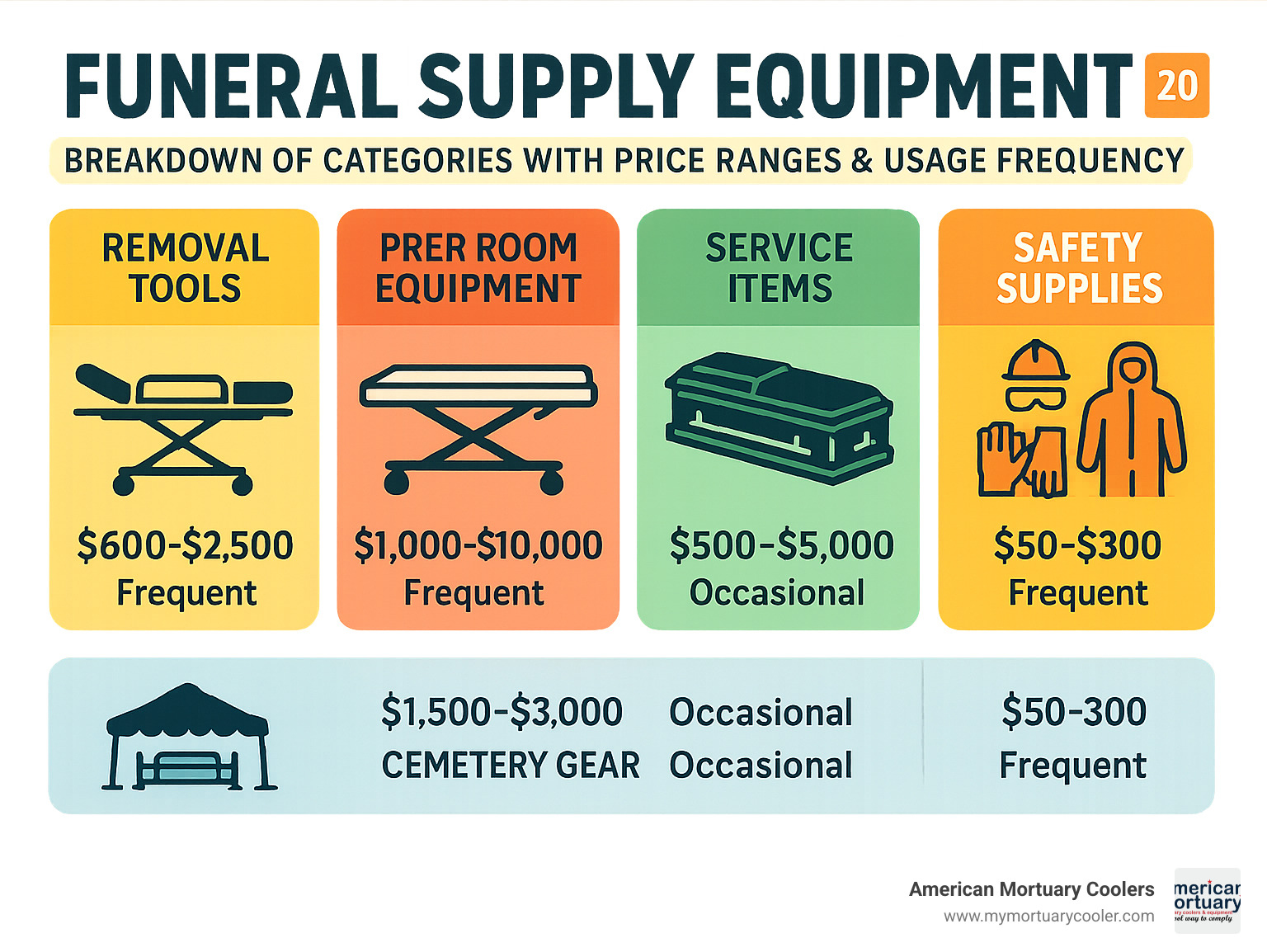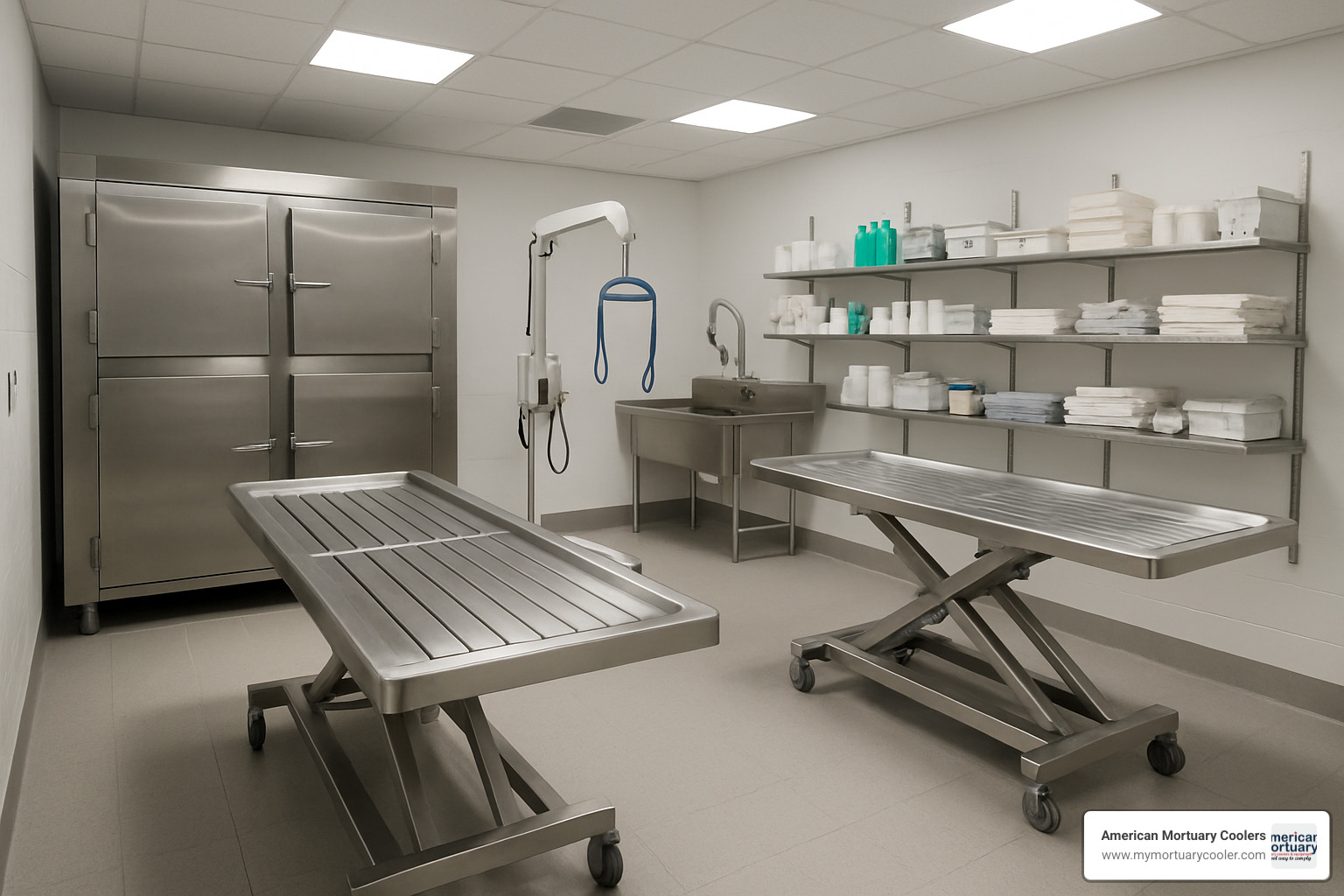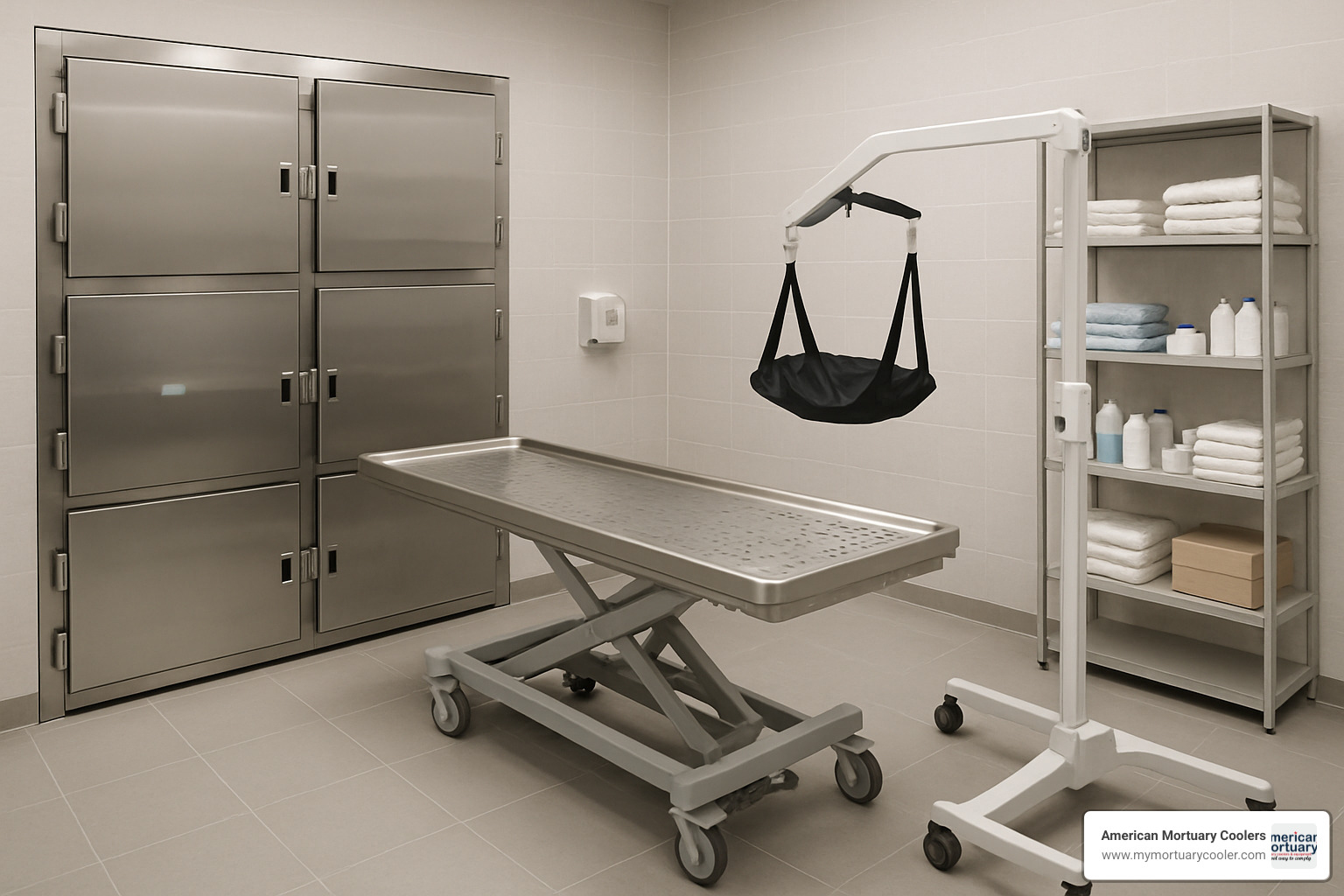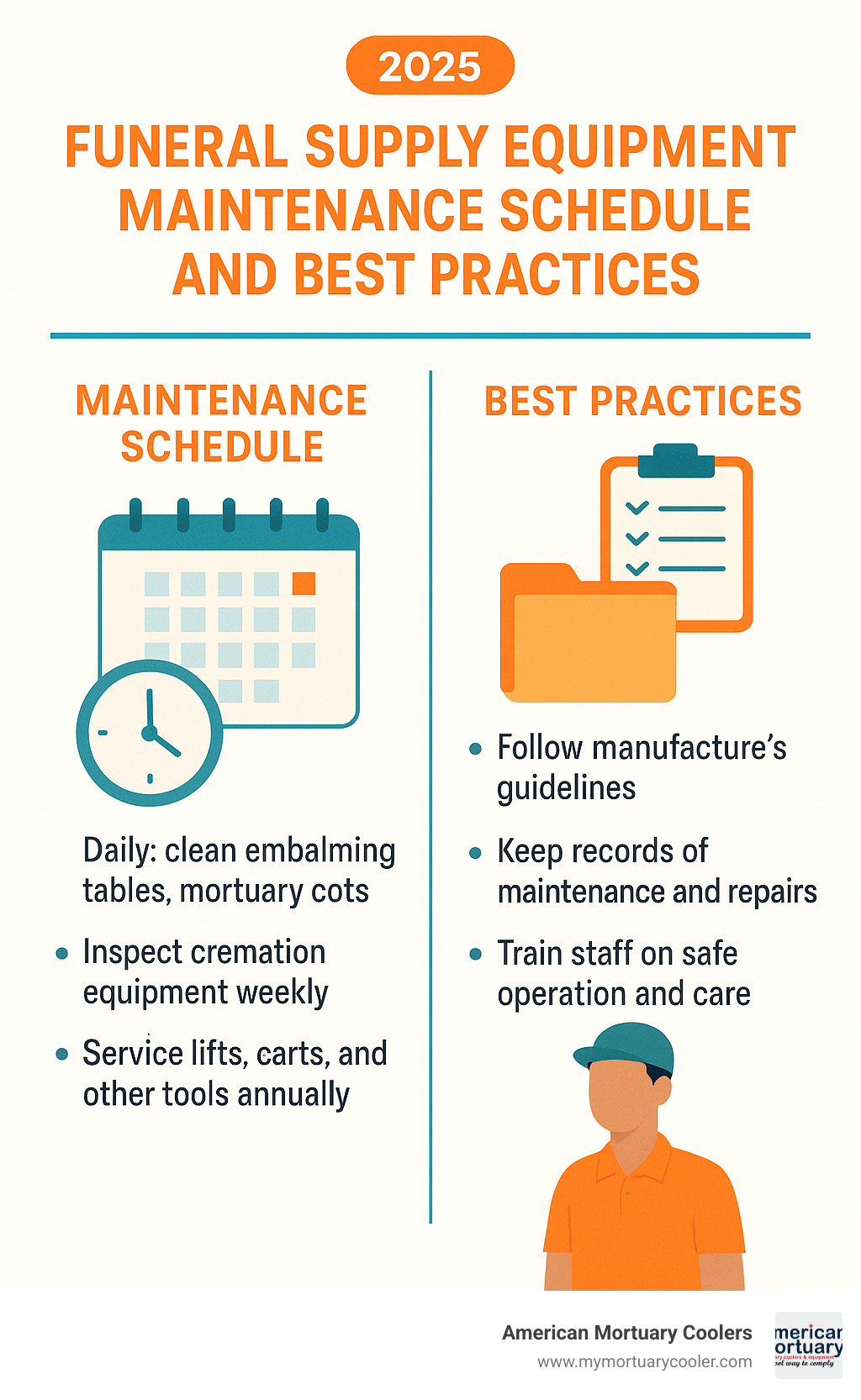Why Funeral Supply Equipment Forms the Foundation of Professional Death Care
Funeral supply equipment encompasses the specialized tools, machinery, and supplies that funeral homes, cemeteries, and crematoriums need to serve families with dignity and professionalism. From removal cots and embalming tables to mortuary coolers and casket handling systems, this equipment ensures safe operations while maintaining the highest standards of care.
Essential funeral supply equipment categories include:
- Removal equipment - mortuary cots, stretchers, body bags, transfer boards
- Prep room supplies - embalming tables, body lifts, refrigeration systems, PPE
- Service items - caskets, urns, chapel furniture, viewing accessories
- Cemetery equipment - lowering devices, tents, graveside setup tools
- Vehicle accessories - bier pins, roller systems, hearse equipment
- Safety supplies - disinfectants, protective clothing, ventilation systems
The funeral industry has evolved dramatically over the past decade. Cremation rates continue to rise, now accounting for over 56% of all deaths in the United States, fundamentally changing equipment needs. Meanwhile, families increasingly expect personalized services and eco-friendly options, driving demand for specialized urns, cremation jewelry, and biodegradable products.
Quality matters immensely in this field. As one industry veteran noted: "The quality with the hydraulic embalming table is above and beyond what I expected!" This sentiment reflects why funeral professionals prioritize reliable, American-made equipment that can handle the demanding nature of death care operations.
Companies like Lynch Supply have been serving the industry for over 90 years, stocking more than 5,000 specialty products. H.S. Eckels & Company has provided funeral service equipment since 1895, demonstrating the long-term relationships that define this specialized market.
We're American Mortuary Coolers, a national-level mortuary cooler supplier with extensive experience helping funeral homes select the right funeral supply equipment for their operations. Our background includes working directly with funeral directors to solve complex refrigeration and equipment challenges that impact daily operations.

Introduction

The funeral industry sits at a fascinating crossroads right now. What once operated on decades-old traditions has transformed into a field where funeral supply equipment must adapt to changing family needs, new safety requirements, and evolving service expectations.
Walk into any modern funeral home today and you'll see this evolution firsthand. The prep room that once focused solely on traditional burial preparation now accommodates both burial and cremation services. The equipment reflects this shift - from advanced mortuary coolers that maintain optimal conditions for extended care periods to specialized cremation urns that families can personalize in ways previous generations never imagined.
Behind the scenes, funeral directors juggle complex logistics daily. They coordinate removal equipment for transport, manage prep room supplies for various service types, and ensure their facilities meet strict safety and compliance standards. Each piece of equipment plays a crucial role in maintaining the dignity and professionalism that families deserve during difficult times.
The pandemic fundamentally changed how funeral homes operate, accelerating trends that were already reshaping the industry. Improved safety protocols, improved ventilation systems, and upgraded infection control equipment became necessities rather than nice-to-haves. Meanwhile, families increasingly seek eco-friendly options and personalized tributes, creating demand for specialized equipment that many funeral homes had never considered before.
The Rising Need for Professional Gear
The numbers tell a compelling story about where the funeral industry is headed. Cremation rates have climbed past 56% nationally and show no signs of slowing down. This shift means funeral homes need different equipment than they did even five years ago.
Traditional burial-focused operations now find themselves investing in cremation-specific equipment like specialized urns, cremation jewelry displays, and memorial keepsake options. The old model of primarily stocking caskets and burial vaults has expanded to include hundreds of cremation-related products that families expect to see.
Service quality expectations have risen dramatically too. Families research funeral homes online, read reviews, and compare facilities before making decisions. This means your equipment directly impacts your reputation. A well-equipped prep room with modern embalming tables and proper body lifts doesn't just improve staff efficiency - it demonstrates professionalism that families notice and appreciate.
Safety regulations have tightened considerably, especially around infection control and staff protection. OSHA requirements now mandate specific types of personal protective equipment, improved ventilation systems, and improved cleaning protocols. Funeral homes that once operated with basic safety measures now need comprehensive safety equipment suites to remain compliant and protect their teams.
Understanding Funeral Supply Equipment
When we talk about funeral supply equipment, we're really talking about the backbone of professional death care. This equipment encompasses every specialized tool, machine, and supply that funeral homes, cemeteries, and crematoriums depend on to serve families with the dignity and professionalism they deserve during their most difficult moments.
The world of funeral equipment is much more complex than most people realize. It starts with removal tools like mortuary cots and stretchers that funeral directors use for first calls, extends through prep room equipment including embalming tables and refrigeration systems, and includes vehicle accessories that ensure safe transportation. Each piece plays a vital role in the seamless operation that families experience during their time of loss.
What makes this equipment particularly challenging is the strict regulatory landscape it must steer. Every piece must meet OSHA safety standards, comply with FDA regulations for medical devices, and satisfy various state health department requirements. Infection control protocols add another layer of complexity, demanding specific materials and designs that can withstand the rigorous cleaning and disinfection procedures that modern death care requires.
The stakes are simply too high for anything less than professional-grade equipment. When you're serving grieving families, there's no room for equipment failures or safety compromises.
More info about Essential Funeral Home Equipment
Definition and Scope of Funeral Supply Equipment
Funeral supply equipment covers every tool and system needed to handle the deceased with dignity while keeping staff safe and maintaining strict regulatory compliance. This means everything from the mortuary cots used during removals to the sophisticated embalming stations where preparation work happens, plus all the vehicle accessories that make transportation safe and respectful.
The scope has grown tremendously as our industry has evolved. Years ago, most equipment focused almost exclusively on burial services. Today's funeral homes need comprehensive solutions that work equally well for both burial and cremation services. This dual requirement has created some interesting challenges when it comes to selecting equipment and planning facilities.
Modern funeral supply equipment now includes technology components that weren't even on our radar a decade ago. We're seeing RFID tracking systems, digital memorial displays, and computerized embalming stations that represent where traditional death care meets contemporary innovation. It's fascinating how technology is enhancing our ability to serve families while maintaining the personal touch that matters so much.
Why Funeral Supply Equipment Is Critical for Operations
Quality equipment directly impacts your ability to serve families with the dignity and compassion they need during their darkest hours. When equipment fails at critical moments, it can disrupt services, compromise safety, and seriously damage your funeral home's reputation. This is exactly why experienced funeral directors never compromise on reliability and durability when choosing their equipment.
Staff safety represents another absolutely crucial factor. Funeral home employees face unique occupational hazards every day, from chemical exposure during embalming to physical strain from moving the deceased. The right equipment significantly reduces these risks while creating better working conditions and improving job satisfaction for your team.
Your operational efficiency depends heavily on having the right tools for each specific task. A well-equipped prep room allows embalmers to work more effectively and safely, while proper removal equipment enables more dignified first-call services. This efficiency translates directly into better service for the families you serve and improved profitability for your business.
Your reputation in the community ultimately rests on your ability to provide consistent, professional service. Quality equipment forms the foundation that makes this consistency possible, day after day, family after family.
Core Categories of Funeral Supply Equipment
When you walk into a well-equipped funeral home, you're seeing the result of careful planning across multiple equipment categories. Each category serves a specific purpose, and understanding these distinctions helps funeral directors build comprehensive operations that serve families with dignity and professionalism.
Removal equipment forms the foundation of every funeral home's daily operations. This is where everything begins - the mortuary cots, stretchers, body bags, and transfer boards that ensure safe and respectful transportation from the place of death to the funeral home. Companies like Mobi Medical Supply have developed stretchers with weight capacities ranging from 500 to over 1,000 pounds, recognizing that funeral homes need equipment that can handle any situation with reliability and respect.
The prep room represents the heart of funeral home operations, requiring the most sophisticated equipment. Here you'll find embalming tables, body lifts, refrigeration systems, and countless specialized accessories. These items must meet strict safety and sanitation standards while providing the functionality embalmers need to do their best work. Hydraulic embalming tables exemplify this balance - they can support up to 1,000 pounds and feature 14-gauge stainless steel construction that's both durable and easy to sanitize.
Service items encompass everything families see during their most difficult moments. Caskets, urns, chapel furniture, and viewing accessories all fall into this category. The variety here has exploded in recent years as families seek more personalized tributes. Cremation jewelry alone now ranges from $35 to over $4,800 according to Lynch Supply's catalog, reflecting the growing demand for unique memorial options.
Cemetery equipment addresses the specialized needs of graveside services and burial operations. Lowering devices, tents, graveside setup tools, and monument handling equipment ensure that final services proceed smoothly and safely. Manchester Supply has built their reputation around servicing lowering devices, employing factory-trained technicians who understand how critical reliable equipment is during these solemn moments.
Funeral Supply Equipment for Burial vs. Cremation
The dramatic rise in cremation rates has fundamentally changed how funeral homes approach equipment planning. Traditional burial services require their own set of tools - casket handling equipment, full embalming stations, and graveside accessories. Cremation services need a different toolkit entirely, including cremation containers, specialized urns, and cremation jewelry for holding precious remains.
Most successful funeral homes today operate what we call dual-track systems. They've invested in equipment that serves both burial and cremation families effectively. This requires thoughtful planning and often means purchasing equipment that might not see daily use but becomes absolutely essential when needed. A funeral home might need both traditional casket trolleys and specialized cremation container handling equipment sitting side by side.
The merchandising aspect tells a similar story. Burial services typically involve selecting caskets, burial vaults, and graveside flowers. Cremation services focus on urns, keepsake jewelry, and scattering accessories. This creates entirely different inventory and display requirements that smart funeral directors plan for carefully.
| Equipment Category | Burial Focus | Cremation Focus |
|---|---|---|
| Primary Container | Caskets (metal, wood) | Cremation containers, rental caskets |
| Preparation | Full embalming stations | Basic preparation, refrigeration |
| Final Disposition | Graveside equipment, lowering devices | Crematory tools, processing equipment |
| Memorialization | Monuments, flowers | Urns, jewelry, scattering accessories |
| Vehicle Needs | Hearse, flower car | Smaller transport vehicles |
Essential Pieces Every Funeral Home Must Own
Some pieces of funeral supply equipment are absolutely non-negotiable, regardless of your facility's size or service focus. Mortuary coolers top this list every time. Proper refrigeration isn't just good practice - it's required by law in most jurisdictions and essential for maintaining dignity and public health. We've worked with countless funeral homes over the years, and we've seen how proper refrigeration forms the backbone of professional operations.
Mortuary cots and stretchers rank equally high on the essential list. You'll need these for every single removal and transfer, making them some of the hardest-working pieces in your facility. Quality cots like the MOBI F500 handle standard cases reliably, while bariatric models ensure you can serve larger individuals safely and respectfully. These investments pay dividends in staff safety and operational efficiency.
Body lifts and embalming tables represent major capital investments that directly impact your preparation capabilities. Hydraulic systems reduce the physical strain on your staff while providing the precise positioning needed for professional results. The quality of equipment you choose here often determines your funeral home's long-term operational success and your staff's job satisfaction.
Personal protective equipment has become increasingly critical, especially since COVID-19 changed our industry forever. This includes everything from basic gloves and gowns to specialized respiratory protection and cleaning supplies. Companies like Affordable Funeral Supply now emphasize their 24/7/365 availability for PPE and sanitization products, recognizing how essential these supplies have become to daily operations.
Emerging Trends, Quality Standards & Costs
The funeral industry is experiencing a remarkable change, and we're witnessing changes that would have seemed impossible just a decade ago. Families today want services that reflect their values and personalities, creating exciting opportunities for funeral homes willing to accept innovation.
Eco-friendly products have moved from specialty items to mainstream essentials. We're seeing beautiful biodegradable urns crafted from cornstarch, recycled paper, and even mulberry bark. These aren't just environmentally responsible choices - they're often stunning works of art that families treasure. The demand has grown so strong that many funeral homes now dedicate entire display areas to green alternatives.
Personalization has become the name of the game. Families want funeral supply equipment and products that tell their loved one's unique story. Lynch Supply's cremation jewelry collection perfectly illustrates this trend, with options ranging from simple $35 keepsakes to elaborate $4,830 custom pieces. We've seen everything from urns shaped like motorcycles to memorial jewelry containing actual cremated remains.
Technology integration continues to surprise even industry veterans. RFID tracking systems now help funeral homes manage inventory with precision that would make a tech company proud. Virtual memorial services, once unthinkable, have created entirely new equipment categories. Funeral homes are investing in streaming technology and digital display systems to serve families who can't physically attend services.
The financing landscape has evolved too, with companies recognizing that funeral homes need flexible payment options for major equipment purchases. Merchant Services providers now offer specialized programs designed specifically for the funeral industry's unique cash flow patterns.
Ensuring Quality, Safety & Compliance
Quality standards have become more demanding, but that's actually great news for funeral directors. When manufacturers pursue certifications like ISO 9001, FDA approval, and CE marking, you know the equipment will perform when it matters most. These aren't just fancy certificates - they represent real testing and validation that equipment can handle the demanding conditions of funeral service.
We've learned that safety compliance goes far beyond the initial purchase. It's about creating systems that protect your staff every single day. Equipment manufacturers now provide comprehensive training programs because they understand that even the best equipment is only as good as the people using it.
Maintenance has become more sophisticated and, frankly, more reliable. Companies like Manchester Supply have dedicated divisions with factory-trained technicians who specialize in specific equipment types. When your lowering device needs service, you're not dealing with a general repair shop - you're working with experts who understand exactly how that equipment should perform.
Latest Innovations in Funeral Supply Equipment
Artificial intelligence is starting to make its mark on funeral planning, though we're still in the early stages. AI-powered software helps families steer difficult decisions by presenting options based on their preferences and budget. While these tools won't replace the human touch that defines great funeral service, they're proving valuable for handling routine coordination tasks.
Biodegradable products continue to evolve in ways that surprise us. Manufacturers are developing materials that dissolve harmlessly in water for scattering ceremonies, or break down naturally when buried. These innovations often cost more than traditional options, but environmentally conscious families gladly pay the premium for products that align with their values.
3D printing technology is revolutionizing memorial customization. We're seeing funeral homes offer personalized urns, custom memorial jewelry, and even replica keepsakes that capture meaningful objects. What once required expensive custom manufacturing can now be produced affordably in-house. The technology allows funeral homes to say "yes" to family requests that would have been impossible just a few years ago.
Choosing, Financing & Maintaining Your Funeral Supply Equipment
Selecting the right funeral supply equipment supplier requires careful evaluation of multiple factors beyond simple price comparison. Established companies like H.S. Eckels & Company, serving the industry since 1895, and Victoriaville & Co., operating as a fourth-generation family business since 1907, demonstrate the importance of long-term relationships in this specialized market.
Brand reputation carries significant weight in funeral supply equipment decisions. Companies like Vischer Funeral Supplies, recognized for expertise and exceptional service since 1983, build their reputations on reliable products and responsive customer service. When equipment fails during critical moments, having a supplier who can provide immediate support becomes invaluable.
Financing options have expanded significantly, with many suppliers now offering payment plans and leasing arrangements. Affordable Funeral Supply offers financing with three payments of $995 each for major equipment purchases, while other suppliers provide longer-term arrangements for comprehensive facility upgrades.
More info about Choosing a Funeral Supply Company
How to Select the Right Funeral Supply Equipment Supplier
Supplier evaluation should begin with assessing their industry experience and customer base. Companies serving the funeral industry for decades understand the unique challenges and requirements that newer suppliers might miss. This experience translates into better product selection, more reliable support, and deeper understanding of regulatory requirements.
Customer service capabilities deserve careful scrutiny, particularly for 24/7 availability. Vischer Funeral Supplies offers text support at 717-503-9838 for immediate assistance, recognizing that funeral home needs don't follow business hours. This level of accessibility can be crucial during emergency situations.
Repair and maintenance support varies significantly among suppliers. Some, like Lynch Supply, maintain authorized repair facilities for specific equipment brands like Portiboy and Duotronics. Others provide general support or refer customers to third-party service providers. Understanding these arrangements before purchase prevents future complications.
Geographic coverage affects both delivery times and service availability. We at American Mortuary Coolers provide direct delivery across the contiguous 48 states, ensuring consistent service regardless of location. Regional suppliers might offer faster local service but limited coverage for multi-location operations.
Managing Inventory & Upkeep for Longevity
Proper inventory management for funeral supply equipment requires balancing immediate needs with long-term planning. Essential items like body bags, PPE, and cleaning supplies need consistent availability, while major equipment purchases can be planned around replacement cycles and facility upgrades.
Preventive maintenance schedules are crucial for expensive equipment like mortuary coolers, embalming tables, and hydraulic lifts. Following manufacturer recommendations prevents premature failure and maintains warranty coverage. We've seen how proper maintenance can extend mortuary cooler life significantly while reducing operating costs.
Storage best practices protect equipment investments and ensure availability when needed. Stainless steel equipment requires specific cleaning protocols to prevent corrosion, while electronic components need protection from moisture and temperature extremes. Proper storage also maintains regulatory compliance and staff safety.
Record keeping supports both maintenance scheduling and regulatory compliance. Documentation of cleaning, maintenance, and repairs provides evidence of proper care and can be crucial during inspections or warranty claims. Digital systems increasingly replace paper records, offering better organization and accessibility.

Frequently Asked Questions about Funeral Supply Equipment
What are typical costs and financing options?
Funeral supply equipment costs vary dramatically based on complexity and quality requirements. Basic mortuary cots start around $1,400, while specialized bariatric models can exceed $4,000. Hydraulic embalming tables range from $3,950 for basic models to much higher for premium features.
Major equipment purchases often qualify for financing arrangements. Many suppliers offer payment plans, with some providing options like three payments of $995 each for significant purchases. Leasing arrangements are also available for comprehensive facility upgrades or new funeral home setups.
Budget planning should consider total cost of ownership, including maintenance, supplies, and eventual replacement. Higher-quality equipment often provides better long-term value despite higher initial costs. We've seen funeral homes save significantly over time by investing in durable, well-supported equipment initially.
How have rising cremation rates changed equipment needs?
Cremation's growth has fundamentally altered funeral supply equipment requirements. Traditional funeral homes focused on casket handling and embalming equipment now need cremation containers, urns, and cremation jewelry inventory. This shift requires careful planning and often significant additional investment.
Crematory equipment represents a major category that many funeral homes now consider. While not every funeral home operates its own crematory, those that do need specialized equipment for safe and efficient operation. This includes cremation chambers, processing equipment, and safety systems.
Urn variety has exploded to meet diverse family preferences. Lynch Supply stocks urns ranging from simple containers to elaborate designs costing thousands of dollars. This variety requires expanded display space and inventory management systems to serve families effectively.
What role does customization play today?
Personalization has become a major factor in funeral supply equipment selection and service delivery. Families increasingly seek unique ways to honor their loved ones, driving demand for customizable urns, memorial jewelry, and personalized service items.
Branding opportunities have expanded as funeral homes seek to differentiate their services. Custom signage, personalized service folders, and branded promotional items help funeral homes build recognition and loyalty. AG Peters & Son offers various personalization options including name plates, vinyl lettering, and custom car decals.
Technology enables unprecedented customization levels. 3D printing allows creation of truly unique memorial items, while digital engraving systems provide precise personalization on various materials. These capabilities require investment in new equipment but can command premium pricing.

Conclusion
The world of funeral supply equipment keeps changing, and honestly, it's exciting to watch. Families want more personalized services, cremation continues to grow, and everyone's more focused on safety than ever before. These shifts mean funeral homes need to think differently about their equipment choices.
What hasn't changed is the need for reliable, quality equipment that helps funeral directors serve families with dignity. When a mortuary cooler breaks down or an embalming table fails, it's not just an inconvenience - it can disrupt services during families' most difficult moments.
We see this challenge every day at American Mortuary Coolers. From our home base in Tennessee, we work with funeral homes across all 48 contiguous states, helping them find the right refrigeration solutions for their unique needs. Every funeral home is different, and cookie-cutter solutions just don't work.
The future looks bright for funeral homes that invest wisely in their equipment. New technologies like AI planning tools are making operations smoother, while biodegradable products help environmentally conscious families. But these innovations only work when they're built on a foundation of solid, dependable equipment.
Quality funeral supply equipment isn't just about having the right tools - it's about peace of mind. When you know your mortuary cooler will maintain proper temperatures and your embalming table will function smoothly, you can focus on what really matters: caring for families.
The funeral directors who thrive in this changing landscape are the ones who choose their suppliers carefully, maintain their equipment properly, and never forget that every piece of equipment serves a family in their time of need. That's what makes this industry special, and it's why we're proud to be part of it.



















